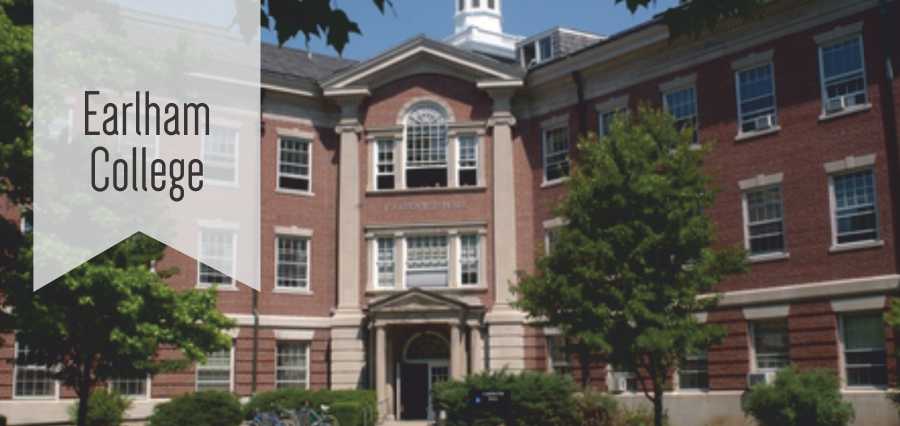Forming a community of global citizens of strong moral character who see the world with broad, inquisitive minds, through their open governance, values, and interdisciplinary-minded, research-focused education.
The United States has thoroughly flourished as a global leader through the prodigy and diligence in the work of its engineers, scientists, and innovators. To pursue more clarity in this increasingly complex world, the youth needs to be equipped with the knowledge and skills to solve tough problems, collect and evaluate evidence, and make sense of all the information. These are the types of skills that students learn by studying science, technology, engineering, and math subjects — collectively known as STEM.
Earlham College provides one such prodigious platform for students to innovate and thrive, with a free-hand, in more than 40 areas of study, including popular STEM majors like Neuroscience, Biology, Chemistry, Biochemistry, Geology, Math, Computer Science and Physics and Astronomy. Earlham was founded by the Religious Society of Friends in 1847 and remains deeply rooted by the Quaker principles and practices of respect for persons, lifelong learning, and the pursuit of truth.
Earlham: A National Liberal Arts “College That Changes Lives.”
- Associate Professor of Chemistry, Lori Watson, recently led a workshop sponsored by the Global Liberal Arts Alliance. The meeting of educators from around the world was designed to promote international collaborations and further the incorporation of research-based pedagogical practices in STEM
- A community-based research project has resulted in a survey of trees in the Richmond area. Chemistry and Environmental Science classes surveyed water and soil quality in the Wayne County area.
- A student-led Astronomy club regularly hosts star gazing events for the community at the College’s observatory.
- Joseph Moore Museum, Earlham’s natural history museum, is a hub for scientific research and collaboration with people of all ages from the outside community.
- Since 2005, Earlham students have been routinely hired to conduct research at Schepens Eye Research Institute/Massachusetts Eye and Ear Research Institute, an affiliate of Harvard Medical School.
- In a class called “Anatomy and Physiology: Nervous and Endocrine Systems,” students perform a dissection of a human cadaver, including an examination of the human brain and spinal cord. Seeing, holding, and dissecting a real human brain is an amazing experience that the college provides.
- Earlham’s 3-2 Pre-Engineering Program provides a wonderful opportunity for students considering a career in engineering who want the experience of a broad, liberal arts education that is seldom available to students in engineering schools.
- Since 2014, teams of Earlham students and recent graduates have traveled to Tanzania to work side-by-side an international team of scientists as part of the Olduvai Paleoanthropology and Paleoecology Project (TOPPP).
Sagacious Educators of Earlham
Earlham’s faculty are experts on such diverse areas as ancient tsunamis, infectious diseases, the ecology and division of labor of ants, the sourcing of ancient Chinese jades and South American pottery shards using X-ray fluorescence, the use of cluster computing in computer science education, the biophysics of membranes and lipids, and representation theory of Lie algebras.
Earlham has produced two Nobel laureates. They include Harold Urey, who was awarded the Nobel Prize in Chemistry in 1934 after discovering deuterium in 1931. The other is Wendell M. Stanley ’26, the namesake of Stanley Hall, who won the Nobel Prize in 1946 for his research on viruses.
Other notable alumni in STEM fields include Howard Federoff ’74, leading researcher into Alzheimer’s disease, and Margaret Heafield Hamilton ’58, a Presidential Medal of Freedom recipient who helped design computer systems for NASA’s Apollo, Skylab and Space Shuttle programs.
The Ornithology Erudite Transforming Earlhamite’s Lives
Wendy Tori is field ecologist and ornithologist with area of focus on bird ecology, behavior, genetics and evolution. Her current research with undergraduates involves working in the field (Amazon and the U.S. Midwest) and in the molecular genetics lab, with Manakins, Bluebirds and Turtles. Wendy loves fieldwork and is deeply interested in Ecology, Environmental Science, Ornithology, Conservation and leading off-campus programs. She regularly engages students in conducting research in the Amazon Rainforest, Ecuador, Peru, Borneo, Indiana and pretty much anywhere she goes around the world. “I teach at Earlham because I like the diversity and how the community embraces people no matter where you come from, or who you are,” asserts Wendy. Her position is supported by The Martha Sykes Hansen Endowed Chair in Biology for Ornithology, the result of a $2.7 million bequest received by the College in winter 2017.
EPIC: Earlham Plan for Integrative Collaboration
The EPIC Advantage guarantees funding for all students to complete at least one funded internship or research experience before graduation, anywhere in the world. EPIC combines classroom learning with immersive learning opportunities in the areas of internships, off-campus study, research, service and entrepreneurship.









